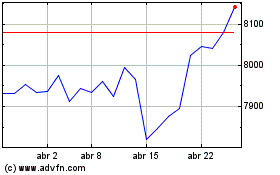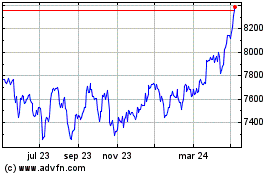By Lucy McNulty
British and European officials are reported to be discussing the
possibility of delaying Brexit, amid ongoing opposition from U.K.
politicians to an exit deal secured by Prime Minister Theresa May
last year.
Representatives of the U.K. have been asking their counterparts
in Brussels about extending the two-year notification period to
leave the trading bloc, according to The Telegraph. Without an
extension, the U.K. will leave on March 29.
The British secretary of state for Brexit, Stephen Barclay, has
denied the reports
(https://uk.reuters.com/article/uk-britain-eu-article50-denial/uk-brexit-minister-denies-telegraph-report-on-delaying-brexit-idUKKCN1P20LD).
Sterling initially jumped on news from $1.27675 at 07:10 GMT to
$1.27840 at 07:20, but it had lost some of those gains to trade at
$1.27642 at around 9 a.m. U.K. time.
READ: Here are 4 ways Brexit could play out, in 1 chart
(http://www.marketwatch.com/story/here-are-4-ways-brexit-could-play-out-in-1-chart-2019-01-07)
Elsewhere, U.K.-based financial companies have shifted assets
worth at least GBP800bn to Europe in an effort to prepare for the
impending split, according to accountancy firm EY
(https://www.fnlondon.com/articles/londons-brexit-bill-800bn-and-counting-says-ey-20190107).
EY's quarterly Brexit Tracker survey found that more than a
third (36%) of the largest U.K. financial companies have confirmed
intentions to move some operations and/or staff to continental
Europe -- up from 31% a year ago.
British investment bank Barclays has already begun enacting such
plan
(https://www.fnlondon.com/articles/barclays-appoints-100-bankers-in-europe-ahead-of-brexit-20190107)s
(https://www.fnlondon.com/articles/barclays-appoints-100-bankers-in-europe-ahead-of-brexit-20190107).
It has appointed 100 investment bankers in Europe as part of a push
to bolster its position in the EU ahead of Brexit.
Q&A: The Brexit story so far...
Negotiators in the U.K. and European Union agreed the terms of
their divorce and a rough outline for their future relationship in
November, almost 2 1/2 years after the U.K. public voted to leave
the bloc.
But a deal is by no means done.
It will only come into effect if parliaments in both the EU and
U.K. agree to sign it into their respective statute books. And
while the majority of European lawmakers support the deal, their
British counterparts are divided.
U.K. politicians had been scheduled to vote on the deal on
December 11. British Prime Minister Theresa May postponed that vote
at the last minute, however, as both pro and anti-EU politicians
complained the deal still left the U.K. exposed to many European
laws without giving it a say in their making.
May's decision to delay the vote prompted frustrated Brexit
supporters in her ruling Conservative Party to launch a leadership
coup. When that failed, the embattled PM appealed to EU leaders for
further concessions that would persuade more U.K. politicians to
back her Brexit deal. As yet, none have been forthcoming.
So what's next?
British politicians are now scheduled to vote on the deal on
January 15. May needs a simple majority of 326 of the UK's 650
parliamentarians for the exit terms she has secured to pass into
national law.
But securing that will be no easy feat.
The Conservatives have a thin majority in the U.K. Parliament.
Several senior government ministers resigned last year in
opposition to her Brexit deal. The Democratic Unionist Party, a
small Northern Ireland party that backs Brexit and props up May's
government, has also repeatedly threatened to reject the agreed
divorce terms.
What happens if May loses the vote?
If May loses the vote on her EU deal by only a small majority --
perhaps fewer than 50 votes -- she will likely once again ask
Brussels for last-ditch amendments to the deal, with a view to
bringing those back to the U.K. Parliament and persuading enough
politicians to back her in a second vote.
EU leaders insist that the deal agreed is the only one on offer
and won't be changed. But they might allow small tweaks in such a
situation.
If May loses the January 15 vote by a large margin, members of
her own party cannot attempt to oust her again. According to the
Conservative party's rules, its politicians cannot instigate a
leadership coup for 12 months after any unsuccessful attempt.
But the opposition Labour Party has said it plans to trigger a
vote of no confidence in the U.K. government if May's deal is
rejected -- a move that could both topple the PM and trigger a
general election.
Is a 'no deal' Brexit then the most likely outcome?
Not necessarily.
The majority of British parliamentarians don't want the country
to crash out of the EU without some agreed exit terms in place. In
a bid to avoid such a scenario, the U.K. Parliament voted in
December to take more control over the final stage of Brexit if
May's deal falls.
Politicians across all parties are pushing forward a series of
amendments to key Brexit legislation that would leave the U.K.
government unable to force the country into exiting without a
deal.
Are there any alternatives to May's deal?
If parliamentarians reject the agreed deal, several British
politicians argue that the U.K. should push for indefinite
membership of a satellite trading bloc to the EU known as the
European Economic Area.
This is sometimes called the 'Norway option,' named after the
EEA's largest member.
This option would keep the U.K. in Europe's single market, or
single economic zone, without being a full member. That is an
attractive prospect to U.S. businesses in London. It is also quite
likely to win widespread support in parliament and in the EU.
What about a second referendum?
May is adamant that the U.K. public has already had its say on
membership of the EU.
However, buoyed by continued opposition to May's deal, pro-EU
politicians in the U.K. are preparing now to get another referendum
on the agenda.
EU officials have suggested they could allow a short extension
to the UK's two-year exit period, which is scheduled to end on
March 29, 2019 -- allowing time for a referendum.
But it remains unclear what question would be put to voters or
even whether enough politicians will support the move.
With so much still unknown, U.K. investors are bracing for a
bumpy ride through the first quarter of 2019. The biggest surprise
for markets remains a vote in support of May's exit deal on January
15.
(END) Dow Jones Newswires
January 08, 2019 04:40 ET (09:40 GMT)
Copyright (c) 2019 Dow Jones & Company, Inc.
FTSE 100
Gráfica de índice
De Mar 2024 a Abr 2024

FTSE 100
Gráfica de índice
De Abr 2023 a Abr 2024
